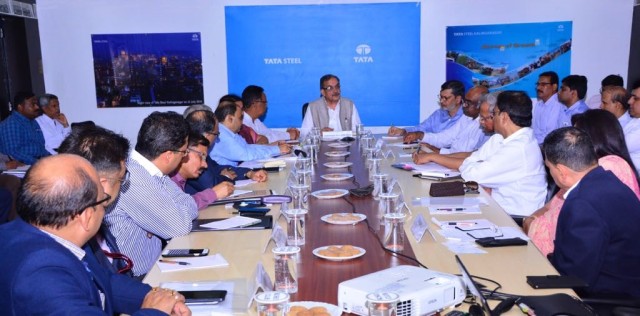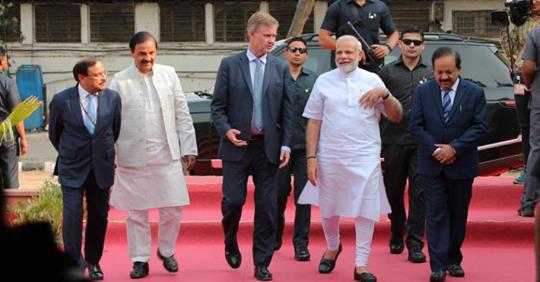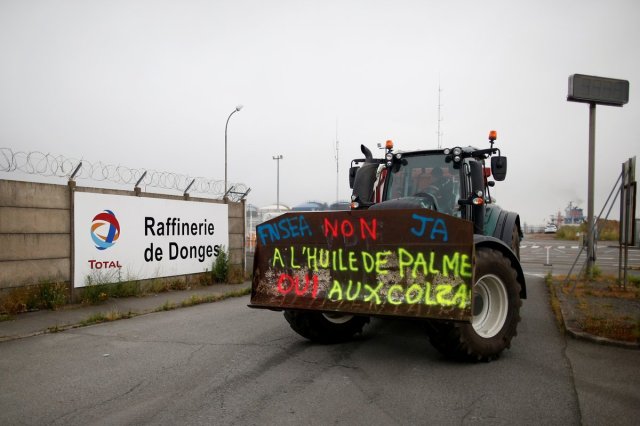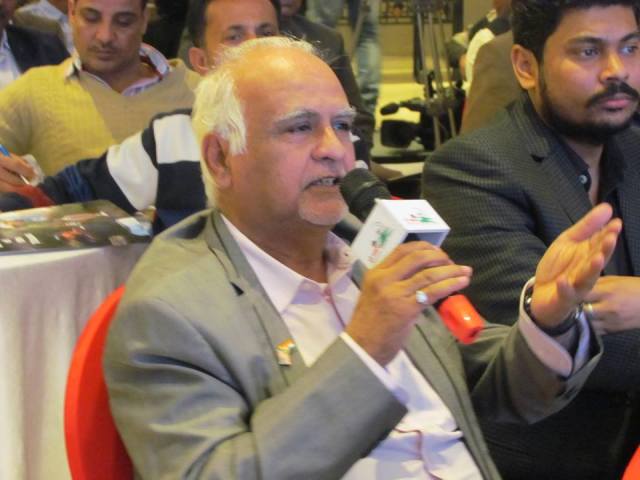Modi echoed American rhetoric about a “shared vision of an open, stable, secure and prosperous” Indo-Pacific, which he described as “a natural region” — countering those who wonder if an area stretching from Bollywood to Hollywood might too vast and disparate to be cast into a geopolitical fact on the ground.
Modi also heaped praise on China, despite its border dispute with India and increasingly close economic ties with Pakistan, India’s neighbor and nuclear rival.
“Our cooperation is expanding. Trade is growing. And, we have displayed maturity and wisdom in managing issues and ensuring a peaceful border,” Modi said.
Ending the “provocative actions” is an essential step towards easing tensions around the Korean Peninsula and creating the “atmosphere of trust” in the region, Russia’s Foreign Ministry said in a statement on Tuesday. This was in response to US President Donald Trump’s statement that it was now “inappropriate” to stage war games in light of the negotiation process. Trump made the remark after the historic summit with the North Korean leader Kim Jong-un. Stopping the US-South Korea war games was one of the conditions Pyongyang proposed for denuclearization.
China’s foreign ministry described Modi’s speech as “positive,” while one of its military delegation at the Singapore conference gloated that India and the U.S. “have different understandings, different interpretations, of this Indo-Pacific.”
The Trump and Kim summit has its new fulcrums, US denuclearisation means North Korea dismantling its nuclear arsenal, for Pyongyang it means scaling down of US forces from both South Korea and Japan, besides ending the annual military drill between the US and South Korea.
Further, there was no mention of missiles, an issue that was brought to the fore in 2017.
Also, the text on MIA remains implies US military figures will visit North Korea. As contained in the joint text, the US and North Korea commit to recovering PoW/MIA remains including the immediate repatriation of those already identified. However, commitment to ‘expeditious’ implementation is good.
The most important of those four key points in the joint text is the third point in which both Trump and Kim ‘commit to work towards the denuclearisation of the Korean Peninsula’.
Indeed, there is plenty of wriggle room in committing to work toward denuclearisation.
The joint text clearly mentions thus: ‘President Trump committed to provide security guarantees to the DPRK, and Chairman Kim Jong Un reaffirmed his form and unwavering commitment to complete denuclearisation of the Korean Peninsula.’
According to Jonathan Cheng of The Wall Street Journal, there are four key points in the Trump-Kim Declaration.
First: The US and North Korea commit to establish new US-North Korea relations in accordance with the desire of the peoples of the two countries for peace and prosperity.
Second: Both would make efforts to build a lasting and stable peace regime on the Korean Peninsula.
Third: Reaffirming the April 27 Panmunjom Declaration, North Korea commits to work towards the complete denuclearisation of the Korean Peninsula.
And fourth: Both sides commit to recover PoW/MIA remains including the immediate repatriation of those already identified.
China welcomed the summit as ‘historic’. Chinese Foreign Minister Wang Yi observed the fact that the two leaders ‘can sit together and have equal talks has important and positive meaning, and is creating new history.’
Wang also spoke of the need for a peace mechanism for the peninsula. While calling for ‘full denuclearisation’ to resolve tensions on the Korean Peninsula, Wang observed: ‘Resolving the nuclear issue, on the one hand, of course, is denuclearisation, full denuclearisation.’
‘At the same time, there needs to be a peace mechanism for the peninsula, to resolve North Korea’s reasonable security concerns.’
It needs to be remembered that Beijing is Pyongyang’s sole major ally and main trading partner. However, it supported others in implementing a slew of UN sanctions to punish the North over its nuclear and missile tests.
Yet, Beijing welcomed Kim twice in quick succession prior to the latter’s summit with Trump. That China continues to remain relevant in any peace process in the Korean Peninsula remains unquestioned.
Despite tensions, the Cold War-era allies sought to mend ties recently, and Kim even borrowed an Air China plane to travel to the landmark summit with Trump in Singapore.
Take others view, Philippine President Rodrigo Duterte’s account of a conversation he had with his Chinese counterpart, Xi Jinping, was startling.
During a meeting between the two leaders in Beijing in May 2017, the subject turned to whether the Philippines would seek to drill for oil in a part of the South China Sea claimed by both countries. Duterte said he was given a blunt warning by China’s president.
“[Xi’s] response to me [was], ‘We’re friends, we don’t want to quarrel with you, we want to maintain the presence of warm relationship, but if you force the issue, we’ll go to war,” Duterte recounted.
A year later, Duterte was asked for a response to news that China had landed long-range bombers on one of the South China Sea’s Paracel Islands — a milestone that suggests the People’s Liberation Army Air Force can easily make the short hop to most of Southeast Asia from its new airstrips. “What’s the point of questioning whether the planes there land or not?” Duterte responded.
His refusal to condemn China’s military buildup underlines China’s success in subduing its rivals in the South China Sea. Since 2013 China has expanded artificial islands and reefs in the sea and subsequently installed a network of runways, missile launchers, barracks and communications facilities.
These military advances have led many to wonder if Beijing has already established unassailable control over the disputed waters. Brunei, Malaysia, the Philippines, Taiwan and Vietnam also have overlapping claims to parts of the South China Sea and its islands – claims that are looking increasingly forlorn in the wake of China’s military buildup.
“What China is winning is de facto control of nearly the entire South China Sea, including all activities and resources in it, despite the other surrounding Southeast Asian states’ respective legal rights and entitlements under international law,” said Jay Batongbacal, director of the University of the Philippines Institute for Maritime Affairs and Law of the Sea.
At stake is the huge commercial and military leverage that comes with controlling one of the world’s most important shipping lanes, through which up to $5 trillion worth of trade passes each year.
U.S. Secretary of Defense James Mattis insists that China faces “consequences” for the “militarization” of South China Sea, which he says is being done for “the purposes of intimidation and coercion.”
“There are consequences that will continue to come home to roost, so to speak, with China, if they do not find the way to work more collaboratively with all of the nations,” Mattis said on June 2 at the Shangri-La Dialogue in Singapore, a security conference organized by the London-based International Institute for Strategic Studies.
Mac Thornberry, chairman of the U.S. House Armed Services Committee, added that the U.S. naval presence means China does not have a free hand in the South China Sea.
“I think you will see more and more nations working together to affirm freedom of navigation through the South China Sea and other international waters,” Thornberry told the Nikkei Asian Review.
But what those consequences might be was left unsaid by Mattis, who suggested that there was little prospect of forcing China to give up its growing network of military facilities dotting the sea.
“We all know nobody is ready to invade,” he said.
Gregory Poling, director of the Asia Maritime Transparency Initiative at the U.S.-based Center for Strategic and International Studies, said, “There is no reasonable basis for the U.S. to use military force to push China off its outposts, nor would any country in the region support such an effort.”
The U.S. pushback so far has included disinviting China from a major Pacific naval exercise. It also continues to carry out so-called freedom of navigation operations, or FONOPs, the most recent of which took place on May 27. This was followed by U.S. military aircraft flying over the Paracel Islands in early June, a move that prompted a countercharge of “militarization’” against the U.S. by China’s Foreign Ministry.
China regards the FONOPs as sabre-rattling and “a challenge to [our] sovereignty,” according to Lt. Gen. He Lei, Beijing’s lead representative at the Singapore conference.
He restated the government position on troops and weapons on islands in the South China Sea, describing the deployments as an assertion of sovereignty and said that allegations of militarization were “hyped up” by the U.S.
Philippine Defense Secretary Delfin Lorenzana stopped short of endorsing the FONOPs but told the Nikkei Asian Review that “it is our belief that those sea lanes should be left open and free.”
In contrast to Duterte’s reluctance to confront China, his predecessor as president, Benigno Aquino, was frequently outspoken about China’s increasing control of the sea. He pressed a case against Beijing to an arbitration tribunal in 2013 after a protracted naval stand-off the year before around Scarborough Shoal, a rock claimed by both countries and lying about 120 nautical miles off the Luzon coast.
In mid-2016 the tribunal dismissed China’s expansive “nine-dash line” claim to much of the South China Sea and its artificial island-building and expansion, all of which the tribunal said contravened the 1982 United Nations Convention on the Law of the Sea, or UNCLOS.
Duterte said he would not “flaunt” the tribunal outcome, in contrast with his campaign pledge to assert the country’s sovereignty — he even vowed to ride a jet ski to one of China’s artificial islands and plant the Philippine flag there. Manila hopes for significant Chinese investment in roads, rail and ports, as part of Beijing’s Belt and Road Initiative, a multicontinent plan outlining China-backed infrastructure upgrades.
Defense Secretary Lorenzana emphasized in remarks to the media in Singapore that good relations with China remain a priority, regardless of bilateral disputes. “It is just natural for us to befriend our neighbor. We cannot avoid dealing with China, they are near, [and] many Filipinos, including me, have Chinese blood.”
For the Philippines, a U.S. treaty ally, there are growing doubts about whether the American navy would protect them in a conflict with China, something Duterte, a brusque critic of the U.S., has questioned publicly.
Mattis, like former President Barack Obama and his Secretary of State Hillary Clinton, sidestepped a question on that issue in Singapore, saying, “The reason why public figures do not want to give specific answers is that these are complex issues.”
American evasiveness is a reminder to the Philippines that the U.S. might not risk war with China over its old ally. “It is debatable whether Filipinos believe that the U.S. will have its back in a conflict with China,” Batongbacal of the University of the Philippines said. “Duterte’s repeated statements against the reliability of the U.S. as an ally tends to undermine this further.”
Duterte’s reticence has left Vietnam as the sole claimant willing to speak up. Discussing recent developments in the South China Sea, Vietnamese Defense Minister Gen. Ngo Xuan Lich told the Singapore conference, “Under no circumstances could we excuse militarization by deploying weapons and military hardware over disputed areas against regional commitments.”
Lich did not name-check China in his speech, but described “a serious breach to the sovereignty” of another country that “violates international laws, complicates the situation and negatively affects regional peace, stability and security.”
As well as hindering oil and gas projects in waters close to Vietnam, China’s navy has for several years harassed Vietnamese fishing boats — as it does around the Philippines — and continues to occupy islands seized from Vietnam nearly five decades ago.
In 2014, anti-China riots kicked off across Vietnam after China placed an oil rig in South China Sea waters claimed by Hanoi. In early June there were demonstrations against proposals that protesters claimed will give Chinese businesses favored access in so-called Special Economic Zones in Vietnam.
Vietnam’s response to potential isolation has been a cautious dalliance with the U.S. In late 2016, shortly before the election of Donald Trump as U.S. president, American warships docked in Vietnam’s Cam Ranh Bay naval base, the first such visit since the former antagonists normalized ties in 1995. That landmark was followed in March this year by the arrival of a U.S. aircraft carrier to the central Vietnam city of Danang.
Hanoi recently called for greater Japanese involvement in the region’s maritime disputes, perhaps signalling an interest in a wider effort to counter China. But unlike the Philippines, Vietnam, which like China is a single party communist-run state, is not a U.S. treaty ally. Historical and ideological differences mean that there are limits to how closely Vietnam will align with the U.S.
“I think there is a good momentum with defense cooperation with the U.S. But I don’t think that it would immediately mean jumping into the ‘American camp,’ whatever it means,” said Huong Le Thu, senior analyst at the Australian Strategic Policy Institute.
U.S. has sought to widen the array of countries it hopes will join it in countering China’s rising influence. During his 12-day swing through Asia in late 2017, Trump peppered his speeches with references to the “Indo-Pacific,” dispensing with the long established “Asia-Pacific” label in favor of a more expansive term first used by Japan.
The “Indo-Pacific” was then mentioned throughout the U.S. National Security Strategy published soon after Trump’s Asia trip — a document that alleged China aims to “challenge American power” and “is using economic inducements and penalties, influence operations, and implied military threats to persuade other states to heed its political and security agenda.”
Three days before his Singapore speech, Mattis announced in Hawaii that the U.S. Pacific Command would be renamed the Indo-Pacific Command, describing the expanded theater as stretching “from Bollywood to Hollywood.”
Mattis later added some gravitas to the cinematic catchphrase, saying in Singapore that “standing shoulder to shoulder with India, ASEAN and our treaty allies and other partners, America seeks to build an Indo-Pacific where sovereignty and territorial integrity are safeguarded — the promise of freedom fulfilled and prosperity prevails for all.”
The Trump administration clearly hopes for greater Indian involvement in its efforts to counter China’s growing influence. Kori Schake, deputy director-general of the International Institute for Strategic Studies, said that while “Indo-Pacific isn’t yet an established part of the lexicon,” the implications of the term are clear.
“India is an Asian power. The countries adopting the term are encouraging India into greater cooperation in maintaining the maritime commons in the Indian and Pacific oceans,” said Schake, a former U.S. State Department official.
South Korean media were sharply divided in their assessments of Tuesday’s historic summit between U.S. President Donald Trump and North Korean leader Kim Jong Un, with conservative news outlets blasting the meeting and one liberal paper lauding it.
North Korean media regard Tuesday’s summit with the United States as an epoch-making event to create “a radical switchover” in hostile bilateral relations.
State-run media reported on Wednesday for the first time that the nation’s leader Kim Jong Un and US President Donald Trump had held an “epoch-making meeting” in Singapore and signed a joint statement.
The report says the leaders shared the recognition of the principle of step-by-step and simultaneous action in achieving peace, stability and the denuclearization of the Korean Peninsula. It suggests that Trump showed his understanding of a North Korean demand for the phased denuclearization of the peninsula.
The media report quotes Kim as saying that “it is urgent to make a bold decision on halting irritating and hostile military actions against each other.”
It says Trump expressed his intention to halt US-South Korea joint military exercises over a period of goodwill dialogue between North Korea and the United States.
The report says Trump suggested the US would offer security guarantees to North Korea and lift sanctions against it, if mutual relations improve through dialogue.
It says the summit was an “event of great significance in making a radical switchover in the most hostile North Korea-US relations, as required by the developing times.”
The media made no mention of Trump’s remarks to reporters that the leaders had discussed the abduction of Japanese nationals by North Korea, or that Kim had agreed to destroy a major testing site for ballistic missile engines.
Trump told reporters on Tuesday that Secretary of State Mike Pompeo and National Security Advisor John Bolton will hold follow-up talks with North Korean officials next week.
But some observers say the upcoming talks are likely to face twists and turns because the leaders did not agree on any details of the denuclearization process
media agencies








